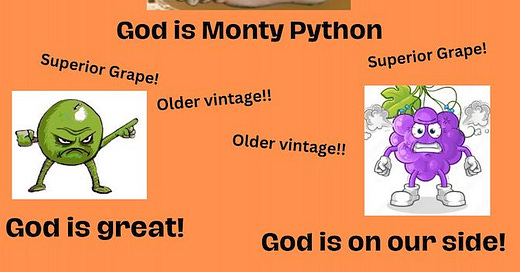“...and in the eyes of the people there is the failure; and in the eyes of the hungry there is a growing wrath. In the souls of the people the grapes of wrath are filling and growing heavy, growing heavy for the vintage.” John Steinbeck
As children we’re all programmed into the concept of duality. Things are either right or wrong. Good behaviour is rewarded. Bad behaviour is punished. For guidance, rules determining what is right and wrong were written down in old books like the Bible, the Koran and the Torah.
The rules in these books apparently weren’t written by humans, they were channelled from God. The fact that God was the originator of these rules is slightly suspect… given that the rules vary, and the versions of the story differ.
It seems likely (now that we have an understanding of physics) that God is the genderless Source Energy of Unconditional Love and Infinite Creativity. As such, God would probably favour the inclusive thriving of all living things. “He” is unlikely to takes sides, preferring tulips to roses or Jews to Arabs. Having favourites is just bad parenting.
But most of the old books portray God as a large misogynistic man with anger issues.
The rules outlining “what is bad” are described in the Seven Deadly Sins. They were written at a time when it was considered a sin to “covet your neighbour’s ox” and when the value of women was only slightly above that of the ox.
These “sins” could do with a bit of a re-vamp if we want to evolve past this endless fighting of either/or winner or loser. If Mother Nature had been given a voice back when the books were written, she might have had a few things to say about the bedtime stories being read to her children.
Going from either/or to both/and means leaving the world of things like identity, tribes and gender and moving into the realm of energy – which contains neither of these things.
It means moving from God as Rules to God as Flow.
So the first “sin” is WRATH. (the next six to follow).
Wrath is the old religious word for Extreme Anger. To counteract this sin, the church elders advised people to do the exact opposite – suppress anger and choose peace. In the either/or world of duality, if something is bad, the opposite must be good.
This is a noble sentiment. Unfortunately, energy can’t be suppressed… it just moves somewhere else. Anger is pushed from the heart down to the solar plexus, where it hides like a sleeping dragon.
In true storybook fashion, when this dragon is triggered into wakefulness, it spends its time preying on virgins, hoarding treasure and scorching enemies with its fiery breath.
In the Middle Ages, this metaphor became real, as the religious started burning “witches” at the stake. How dare these women make them feel the bad energy of sexual desire, envy or fear? In the “holy” books there were only two ways of dealing with bad energy – control it or kill it. Unfortunately, energy doesn’t respond well to this strategy because… physics.
Our entire history as a species is one of wrath and endless wars. Once humanity stopped being so bloodthirsty, this rage didn’t go away, it just turned into passive aggression. Socially acceptable wrath.
So what would Flow do?
Flow can release trapped energy and turn it into culture. Some of the greatest artists have used their anger to create plays, books, poetry and art. Some of the greatest athletes have used theirs to break records.
Wrath can be turned into rocket fuel for the dispossessed. It can fight for justice, protect the innocent, and be a powerful instrument for change in the world.
Our addiction to smartphones doesn’t help in this regard. Everyone’s favourite X – Twitter is awash with outrage expressed as opinions. It’s heady stuff, being disconnected from the source of Flow. Meanwhile, sleeping dragons are waking up and creating mayhem and madness on the world stage.
In addition to the need to move from either/or to both/and, there is currently a lot of interest in the concept of going from “I” to “We”.
But this is nothing new.
John Steinbeck, in his novel The Grapes of Wrath wrote about the need to band together, rather than focus on individual gains. He wrote the following sentence in 1938.
“The quality of owning freezes you forever in “I” and cuts you off forever from the “we.”
As we chase solutions with new, better and different ideas, it’s important to realise that ideas are cheap. Following through on ideas is where change happens. There hasn’t been a lot of follow-through in the 85 years since John Steinbeck first nailed this concept of “I” to “We”.
To end on a lighter note John also wrote something beautiful and poignant about his heroine in the great depression “It was her habit to build up laughter out of inadequate materials.”
Don’t you just love literature?
In our current climate of rage and conflict, we all feel a lack of resources. In the face of this it’s important to remember that simple things done with grace are powerful… the sharing of humour, love, creativity and authentic connection… building laughter from inadequate materials.
Based on a chapter about the Seven Deadly Sins from Flow Without The F*ckery. Available on Amazon.




